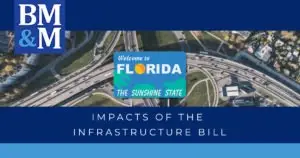
Anyone who follows the current news is aware of the recently enacted $1.2 trillion Infrastructure Investment and Jobs Act.
It should not be surprising that the new Infrastructure Act will have short- and long-term impacts on Florida. The following is excerpted from Alex Daugherty’s November 9, 2021 report in the Miami Herald about that topic.
Before addressing Florida, a summary of the national scope of the Infrastructure Act:
A total of $110 billion will be spent on repairing roads and bridges, $39 billion on public transit, $66 billion for Amtrak, $7.5 billion for electric vehicle charging stations, $65 billion for broadband internet access, $65 billion for the electric grid, $25 billion for airports and $55 billion for water and wastewater infrastructure. The bill includes $550 billion in new federal spending, and the Congressional Budget Office, a federal agency that provides budget and economic information to Congress, estimated that the bill will increase the federal deficit by $256 billion over the next decade.
As to Florida specifically,
In Florida, the White House estimates that $13.1 billion would be spent to rebuild and modernize Florida’s highways with an additional $245 million for bridge replacement and repairs. The White House cited data from the American Society of Civil Engineers that said 3,584 miles of highway and 408 bridges in Florida are in poor condition.
The White House also said Florida expects to receive $2.6 billion over five years to improve public transit. And the state would get $198 million over five years to expand an electric vehicle charging network, with an opportunity to apply for $2.5 billion more in grants to further expand EV charging stations.
To consult with an experienced employment and labor law lawyer today, call 855-780-9986
Florida would get $100 million to expand broadband internet coverage across the state, which the White House says would give internet access to more than 700,000 Floridians who currently do not have it. An additional 6.5 million Floridians, or anyone with an income at or below 200% of the federal poverty line (about $25,500 for an individual in 2021), would be eligible for a $30 a month internet subsidy under the bill.
The state will receive $1.6 billion over five years to improve drinking water infrastructure, $26 million to protect against wildfires, $29 million to protect against cyberattacks and $1.2 billion for airports.
Further,
… specific projects in Florida that end up benefiting from the infrastructure bill will be determined over the coming months and years by various federal agencies and Congress through the federal funding process. One example is Everglades restoration funding, a high priority for Florida lawmakers from both parties.
The U.S. Army Corps of Engineers works with the state of Florida on Everglades restoration projects but will ultimately control $11.6 billion for construction projects as part of the bill. Florida lawmakers argued last week that is ample funding to cover the federal government’s $5 billion share for approved Everglades restoration projects.
Click to contact our Florida Attorneys today
But the Congressional Research Service, a nonpartisan arm of Congress that provides research to lawmakers, estimated that the Army Corps has a $109 billion construction backlog. Florida-specific projects like completing the Everglades Agricultural Area Reservoir will ultimately compete with other projects around the country for funding.
This series will continue to follow the Infrastructure Act as it rolls-out nationally and through Florida.
Submit a Consultation Request form today
For more information, call Philip N. Kabler, Esq. of the Gainesville, FL office of Bogin, Munns & Munns, P.A. at (352) 332-7688, where he practices in the areas of business, real estate, banking, and equine law. He has taught business and real estate law courses at the University of Florida Warrington College of Business Administration and Levin College of Law. He is a member of the Greater Gainesville Chamber Board of Directors, and is the Immediate Past President of the Eighth Judicial Circuit Bar Association.
=====================
NOTICE: The article above is not intended to serve as legal, financial, or investment advice, and readers should not rely on it as such. It is offered only as general information. Readers should consult with an attorney regarding their legal matters, as every situation is unique.
Call or text 855-780-9986 or submit our Consultation Request form today





